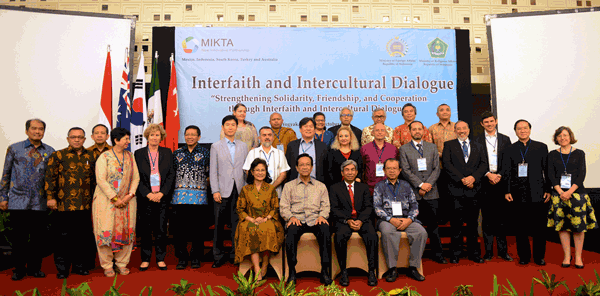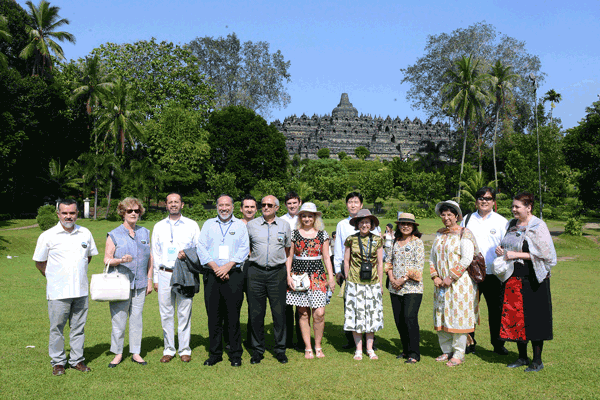Government has key role in interfaith dialogue
26 Oct 2016 - by
Government has a vital role in promoting interfaith dialogue as a key element in nurturing friendship across cultures, religions and nations, a Charles Sturt University (CSU) theologian told an international forum in Indonesia last week.
Executive Director of the CSU Australian Centre for Christianity and Culture the Right Reverend Professor Stephen Pickard was one of a seven-strong Australian delegation invited to the MIKTA forum by the Australian Government's Department of Foreign Affairs and Trade (DFAT).
 MIKTA is an innovative partnership formed at Foreign Minister level by Mexico, Indonesia, Republic of Korea, Turkey, and Australia. The theme of the forum in Jogjakarta was 'Strengthening solidarity, friendship, and cooperation through interfaith dialogue'.
MIKTA is an innovative partnership formed at Foreign Minister level by Mexico, Indonesia, Republic of Korea, Turkey, and Australia. The theme of the forum in Jogjakarta was 'Strengthening solidarity, friendship, and cooperation through interfaith dialogue'.
Professor Pickard (pictured with the delegation at right) addressed the first session of the MIKTA forum and amplified the theme by highlighting 'the role of government'. He spoke to five central points: the priority of friendship; friendship through interfaith dialogue; the role of government as mediator of friendships; government facilitation of friendship through interfaith dialogue; and, the role of government in the Australian context.
"Friendship, solidarity and co-operation are generated by open, generous and truthful relationships, and of these three, friendship is fundamental," Professor Pickard said. "In the fragmented and often confused and conflicted world, friendship may be the great common denominator for human beings, a gift worth nurturing for the common good."
Professor Pickard emphasised that interfaith dialogue offers a window for others into the process by which true friendship across diversity and difference might actually be achieved.
 "This is never a simple or easy task, since there is, in fact, no cheap friendship," he said. "Patient and attentive interfaith engagement will most certainly reveal the true cost of friendship. It also offers a seed of hope for renewed solidarity and cooperation between peoples of diverse cultures, religions, languages and nations.
"This is never a simple or easy task, since there is, in fact, no cheap friendship," he said. "Patient and attentive interfaith engagement will most certainly reveal the true cost of friendship. It also offers a seed of hope for renewed solidarity and cooperation between peoples of diverse cultures, religions, languages and nations.
"Therefore, national governments have a critical mediating role within a global and cosmopolitan world, to keep lines of communication open, to keep conversations properly earthed in face-to-face relations, and to nurture expressions of friendship and cooperation between nations."
When it comes to interfaith dialogue, Professor Pickard said the first task of government is to properly grasp the significance of the religious and spiritual life of its people, and this is specific to each country with its particular history and cultural, ethnic mix.
"The religious instinct and spiritual yearnings of humans are irrepressible, and they are neither incidental to being a human being nor an aberration," Professor Pickard emphasised.
"Recognising and welcoming the strength and reality of a people's spiritual and religious life is critical if a government is to play a positive and meaningful role in fostering the things that release the potential for religions to contribute to social well-being. This potential in religious traditions is always enhanced through conversation, listening and a willingness to learn from one another."
Concluding his address with reference to the role of government in the Australian context, Professor Pickard said government has a vital role in fostering and promoting the public space as a place for new religious engagements.
"If governments work hard at this, in an increasingly post-secular environment, it will allow the deeper aspirations of people, their rich but often ignored spiritual intuitions to be appreciated and respected," he said.
"When government - through policy and programs - opens up the public space for interfaith dialogue a new conversation begins to take shape and the seedbed for friendship, solidarity and cooperation is planted. I say seedbed because it takes time to grow such things. The garden of friendship through interfaith dialogue is a garden where the weeds of fear and suspicion cannot live. Government has a critical and positive role to play in this."
ends
- Australian Centre for Christianity and Culture
- About Us
- Latest News Assets
- Government has key role in interfaith dialogue

